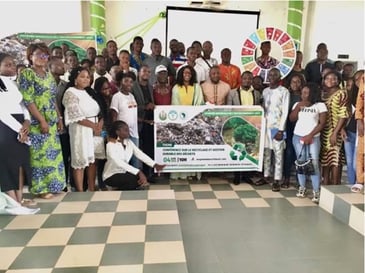Africa’s Creatives Are Promoting Sustainability to Combat Climate Change

In her 2004 Nobel Peace Prize acceptance speech, Wangari Maathai, the late Kenyan activist, spoke of the “central role” of culture in the political, economic, and social life of communities. She also charged Africans and the rest of humanity with their responsibility to the Earth, saying, “Today we are faced with a challenge that calls for a shift in our thinking, so that humanity stops threatening its life-support system.”
With a population of more than 1 billion and growing, Africa contributes the least of any continent towards global carbon emissions, but stands to lose the most if the projections for climate change are realized. This is further compounded by the fact that since 1900, east Africa is estimated to have lost more than 80% of forest cover, while west Africa has lost more than 90%.
This trend will be accelerated as Africa is already undergoing rapid urbanization, resulting in more deforestation and polluted air and water bodies. With the growth of Africa’s middle class, there will be a greater aspiration for convenience, including consuming disposable goods, resulting in greater pressure on the environment.
The coronavirus pandemic has shifted just about every metric on the planet. But chaos presents an opportunity for recalibration. This crisis has reaffirmed the need to create sustainable practices in spite of the constraints that are emerging from the pandemic. Those who have been able to utilize opportunities to produce more locally and take steps to strengthen local supply chains have fostered positive change during this tumultuous time.
Africa’s creative industries and cultural economy play an important role in staving off this future and ensuring sustainability. The greatest areas of innovation are being witnessed in building design, fashion, and visual arts.
How African creatives are embracing sustainability in urbanization
The rapid urbanization process in African cities leaves room for local artistic and cultural influences to be harnessed. The cultural economy can facilitate the integration of sustainability into urban designs, ranging from the use of public spaces to the design of buildings.
Architecture’s most prestigious honor—the Pritzker Prize—was recently awarded to Diébédo Francis Kéré, a Burkinabè-German architect known for ingenious, climate-resilient structures, that draw on historic architectural best-practices from his country of origin, Burkina Faso.
Another example is, Rwanda’s Gahanga Cricket Stadium, which opened in 2017. It has been recognized for utilizing sustainable construction methods. It won awards for its distinct design that blends the stadium into the surrounding area and merges cricket with Rwanda’s famously hilly terrain.
In Ghana, the seat of the presidency, Jubilee House draws upon local culture for the design of the structure. In the quest for sustainability, solar panels are being installed as part of the government’s “Solar Rooftop Programme” to utilize solar energy to power government buildings.
This heavy reliance on second-hand imports has had a negative impact on local textile and apparel markets in countries including in Zimbabwe. This practice also contributes to waste generation from “fast fashion.”
Some critical steps are being taken to begin to reverse this trend. The demand for sustainable fashion in African countries already exists—and some designers and companies are stepping up to meet this challenge. They include the Senegalese fashion house Tongoro, which relies on local, eco-friendly materials and has been featured in major fashion publications.
Mitimeth, a Nigeria-based company, aims to make handcrafted products, using natural fibers from items such as corn husks that would otherwise be discarded. In 2018, IKEA partnered with South African designer Sindiso Khumalo for its Överallt furniture collection. Khumalo, a celebrated South African fashion designer and recipient of the prestigious 2020 Green Fashion Awards, combines sustainability, social impact, and empowerment in her fashion. She takes pride in using organic cotton and hemp for her textiles.
Africa’s visual artists and how they are addressing sustainability
Visual artists can also be a source of inspiration for sustainability. A number of artists are using recycled waste to design compelling works that have gained regional and global prominence.
Ugandan artist Ruganzu Tusingwire was inspired to reuse plastic bottles to design an award-winning recycled amusement park for Ugandan children, building on the works he and other artists have created from trash in the capital of Kampala. The Ghanaian sculptor El Anatsui, who is based in Nigeria, has a storied career combining arts, culture, and sustainability. His works, consisting of recycled wood, bottle caps, and iron nails, have been featured at the Venice Biennale and at the Tate Modern museum.
What’s the way forward for sustainability in creative industries in Africa?
Three main threads emerge to further cultivate and embed sustainability practices into the process of creativity. The first entails the design of buildings. Architecture that infuses African cultural elements (as seen at Jubilee House in Ghana) with eco-friendly standards in the design and building processes can provide benefits that include the preservation of local culture, facilitating a greater diversity of structures, protection of the environment and boost in economic activities.
As much as 75% of the carbon footprint of all buildings in their lifetime comes from the materials they are made from rather than the energy used to power them for several decades. Concrete and steel are the biggest culprits. Wood, which is now being used to build high-rise buildings in Canada and Norway, negates this problem.
Second, this approach can also apply to the fashion world where waste is a natural by-product of hyper consumerism. If the industry could use and champion the concept of recycling and up-cycling in the design, sourcing, and production of materials for consumption, it could yet turn things around. African designers are leading in this realm and can continue pioneering new innovations that are both eco-friendly and have design appeal.
Third, creating works utilizing recycled materials while drawing upon local cultural influences can be a catalyst towards sustainability. One such example includes Sanusi Olatunji, a Nigerian artist whose body of work includes “Waste is Wealth,” is focused on targeting a consumer market for products made from recycled materials. But at the same time his work is desirable for both individuals and galleries.
The future of sustainability in Africa
Most African countries do not have the financial resources that more developed nations in Asia, Europe, and North America have to mitigate the effects of climate change. African countries will need to find internal resources to support sustainability initiatives.
Leaders across the creative community can facilitate behavioral change and can help reshape the inputs required for production across various industries. Progress can emerge through the ingenuity of everyday people; the long-cherished cultural practices of nomadic communities; or the innovation of artists, engineers, and architects.
The elements are already there for an African future grounded in sustainability. The right leadership, persistence, and investment can foster a sustained appreciation for the environment on the African continent that serves as a model for others.
Explore our Careers in Sustainability webinar series by viewing our recorded webinars.
Originally published on Quartz Africa.




